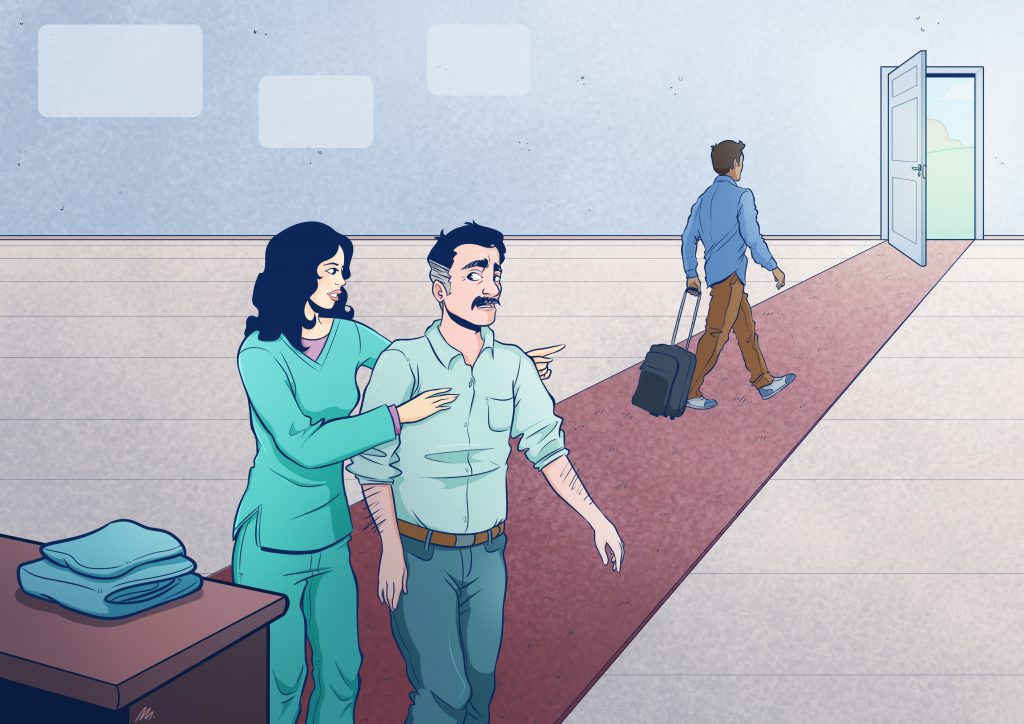‘Survivorship’ is a rapidly growing field of research, as more cancer patients live longer, and require different types of support to get their lives back on track. Typically such research has been disconnected from clinical trials, but this may be starting to change, as Anna Wagstaff reports.
Survival is a necessity after a cancer diagnosis, but ‘getting one’s life back’ is what everyone aspires to after treatment. Yet the literature on long-term outcomes reveals very little evidence about some of the things that matter most.
Does the pain, fatigue, sickness or neuropathy reported during clinical trials abate or continue, and if it continues, how severely and for how long? How does the experience of having that cancer and undergoing that treatment affect people’s confidence, wellbeing, the ability to fulfil roles as parent, partner, carer, friend? What’s the success rate in terms of capacity to have children, to work, to enjoy sex and enjoy their leisure time, to travel and to make plans, take out loans or mortgages and generally carry on normal life?
As advances in early detection and treatment lead to more cancer patients being cured or living longer with cancer, these aspects of long-term outcomes are giving rise to a new field of ‘survivorship’ research.
 However, such research is fragmented and has diverse aims: defining and meeting the needs of survivors, assessing the efficacy and value for money of different interventions and pathways of care, and/or looking for ways to mitigate the economic burden of growing numbers of survivors. Research is typically conducted within different academic settings, looking at different sets of indicators for different cancer populations and usually without any reference to the specifics of their diagnosis or treatment.
However, such research is fragmented and has diverse aims: defining and meeting the needs of survivors, assessing the efficacy and value for money of different interventions and pathways of care, and/or looking for ways to mitigate the economic burden of growing numbers of survivors. Research is typically conducted within different academic settings, looking at different sets of indicators for different cancer populations and usually without any reference to the specifics of their diagnosis or treatment.
Step forward the EORTC, Europe’s oldest and largest academic cancer trials organisation, which has been coordinating clinical trials across a wide range of cancers for the last 56 years.
EORTC recently committed to developing and implementing an infrastructure designed to “optimise long-term follow up among patients treated in clinical trials” and promote data sharing with cancer registries and other “data owners”, with a view to reducing wasteful duplication and fostering “scientific collaboration on long-term outcome research”.
The clinical trials group will shortly be piloting its new YOU (Your Outcome Update) protocol, designed for collecting long-term data from patients who participate in EORTC-supported trials. Lifang Liu, coordinator of the YOU protocol, explains the thinking behind it. “Currently long-term outcomes research is quite scattered and normally it is done by academic centres. Pharma are not very interested in long-term follow up – after their drug is approved, they are done with the whole business. At EORTC we are independent, academic and not for profit, following patients for their care and late adverse effects. That is our tradition, and we want to follow up in this tradition. EORTC is working with multiple international tumour groups. The YOU protocol is really built on this collaboration across tumour types. We don’t do breast only. We don’t do Hodgkin lymphoma only. We just do research for all types of cancers, common and rare. And EORTC has this ability to do so.”
EORTC has a long tradition of conducting long-term follow up, including its first ever trial, started in 1964, which looked to optimise treatment of patients with Hodgkin lymphoma, and is still being followed to this day.
“It is our responsibility as oncologists to make sure these patients don’t have to go through a second ordeal to get back to normal life”
What’s new, says Liu, will be the inclusion of highly specific questions about long-term effects that are tailored to the specific treatment protocol each patient received. “So far, evidence on long-term side effects mostly comes from observational data, without prospective randomisation. With the EORTC data, we know the randomisation, we have all the clinical data related to each patient’s treatment, so we can see which treatments cause the long-term effects.”
Liu mentions immunotherapies as a prime example where such research is urgently required. This is an entirely new class of drugs, for which very little is known about long-term toxicities, and where use is beginning to spread from the relatively rare cancers where they first showed their value, to more common cancers where their benefit may be less pronounced. Generating reliable data on the long-term effects associated with different regimens will be essential to ensuring patients get the best evidence-based care – and the EORTC’s YOU protocol, says Liu, will be seeking to provide that evidence, using outcomes measures specifically tailored to the treatments under review (see also ‘PROMs put patients at the heart of research and care’).
More generally, she adds, generating reliable data on long-term outcomes of different therapeutic strategies will offer a unique resource for healthcare providers and payers to see where they need to intervene.
Prejudice and discrimination
The decision to invest so heavily in researching long-term outcomes can be attributed in no small part to Françoise Meunier, who was Director General of the EORTC between 1991 and 2015, and now leads special projects, with a focus on survivors. She is particularly pleased that the YOU protocol will gather evidence on socio-economic outcomes, such as access to financial services and employment.
“This is something totally new. We may have collected follow-up data for 25 years on breast cancer patients treated with radiotherapy, but we have never collected societal issues.”
This is important, she argues, because one of the biggest obstacles survivors can face comes not from the impact of the cancer and treatment on themselves, but from the prejudice and discrimination they face from others: employers who assume that someone with a history of surviving cancer is a liability rather than an asset, insurers who evaluate risk based on the word ‘cancer’ rather than the evidence of a personal prognosis.
Meunier believes that, as a clinical research organisation, EORTC is not only uniquely placed to gather this sort of information, but it also has that responsibility. “I have fought for 44 years as a doctor to improve survival and quality of life of patients with cancer. We have reached a point where we cure 90% of children with leukaemia, 99% of testis cancer, 85% of Hodgkin and so on. So I think it is our responsibility now as doctors and oncologists to make sure these patients don’t have to go through a second ordeal to get back to their normal life.”
She believes robust data on long-term outcomes can help remove unfair barriers in a number of ways. It can be used to shape policies designed to give survivors the support they need and protect them from unfair treatment and prejudice. It can support advocacy to raise awareness of the growing proportion of the population who are living fulfilling lives with or after cancer, and challenge the negative assumptions about survivors that give rise to discrimination. It can also provide insurers with accurate prognostic data on which to personalise risk assessments.
Meunier is keen to work with patients’ organisations, employers, insurers and policy makers to pursue all of these avenues. But it is on the specific question of removing unfair barriers to financial services required to buy a house, start a business or even travel, that Meunier is most determined to force through progress for survivors across Europe. It’s a goal she has been pursuing for many years, and which she believes now has a realistic chance of success (see panel).
Back to work
The EORTC’s decision to focus more on long-term impacts on patients’ lives has been broadly welcomed by the European Cancer Patient Coalition (ECPC), which has affiliates in every country in Europe, representing patients from across the spectrum of cancers.
ECPC President, Francesco de Lorenzo, says, “We know from a study conducted by the Italian Association of Cancer Registries that 800,000 people who were treated for cancer in Italy can be considered cured, i.e. they have the same life expectancy as other people of similar age and socio-demographic characteristics who have not had cancer.”
He believes, however, that the biggest problem for survivors, both socially and financially, is not so much access to financial services, but getting back to work. “Fifty percent of people who can be considered cured of cancer are living with some kind of disability,” he says, and he argues that the priorities must be to fight for access to rehabilitation, and for more protection for survivors against being forced out of their jobs.
Above all, he says, they need action. “It is important to have state-of-the-art cancer research on long-term outcomes, such as that conducted by EORTC. But patients and survivors also need policy right now for survivorship care and social issues to support them with rehabilitation, tertiary prevention and generally assist ‘cured’ people in getting back to work and a normal life. So we cannot hold off until we have more long-term data. We are fighting for that now.”
ECPC is campaigning on many fronts, says de Lorenzo, including working on guidelines for national cancer plans to improve care and support for survivors, as part of CanCon, the European Joint Action on Cancer Control. It is also collaborating with the European Society for Medical Oncology and the International Psycho-Oncology Society on a Patient Guide on Survivorship and a Survivorship Plan, intended to become an integral part of the patient discharge instructions. ECPC also developed a White Paper on Cancer Carers, in partnership with EuroCarers, which set out the principles, framework and policies needed to give people with cancer and their carers a decent quality of life. This was published in October 2017 in the context of a forthcoming Directive to “support work–life balance for parents and carers”.
EORTC’s Meunier understands that survivors don’t want to wait for data before securing change. She argues, however, that high-quality data linked to specific cancers and protocols will be essential to enabling patients and doctors to make informed choices in the future that take into account the overall long-term impact on lives.
Data can also be used to guide service providers towards providing survivors with the right mix of services and support to help them get all aspects of their lives back on track as fast and effectively as possible.
Key to this will be feeding into health technology assessment (HTA) and reimbursement processes, says Meunier. “So far, in discussions with HTA bodies and payers, they are aware of the importance of long-term outcomes, but the problem is that no one wants to [gather the data]. Pharma are not interested, and even if they were forced to do it, they would not have the ability or authority to access the data. EORTC will have this unique contribution. It takes time for people to realise how important this sort of data will be.”
Loans and insurance: new strategies for access
Over the past three years, France and Belgium have adopted laws to help survivors of cancer and chronic diseases improve access to financial services, such as mortgages and insurance. It has taken time for the new systems to get up and running, so details on who is benefiting remain unclear. Françoise Meunier, who leads the EORTC’s survivorship work, believes the two laws offer possible templates that other European countries could follow. She is determined to see similar rights extended to survivors across Europe before she retires.
Under the French law of droit à l’oubli – right to be forgotten – people applying for loan-related insurance need not mention any history of cancer if at least 10 years has elapsed since the end of their active treatment – five years in the case of childhood cancers. Shorter time periods are specified for certain adult low-risk cancers, such as early stage breast or skin cancer, or cancers of the thyroid or testicles, as defined in a reference table. This is updated annually by a commission including representatives from insurance companies and banks as well as the Department of Health and patients, based on data provided by the French National Cancer Institute (INCa).
Another approach, adopted in Belgium, requires companies to justify any decision they make to refuse insurance to people deemed at additional risk or to quote a premium more than 75% above the standard. Risk assessment is done at the individual level, and applicants have the right to appeal to a body composed of representatives from patient groups and the industry, which will base their ruling on data in the literature. Where an additional premium is very high, the bureau can rule that it is paid from a funding pool to which all insurers have to contribute.“A good start”
Marie Mesnil, a lawyer who has been working with the EORTC, says that both systems fall short of what survivors hope for, but are “a good start”. The French droit à l’oubli works well for the patients who qualify for the shorter time periods for their diagnoses to ‘be forgotten’, she says, but “for other people it is quite disappointing as they have to wait for 10 years.” As time goes by it is expected that additional groups of patients will be added to the reference table, she adds, but how far and how fast that happens remains to be seen.
The good point about the Belgian system, by contrast, is that, “each refusal or severely raised premium has to be assessed with a second opinion,” says Mesnil. However, survivors have been disappointed at how seldom the original decision is overturned, she adds. “In 2016, the appeals body upheld the original decision in 77% of cases of elevated premiums, and 85% of refusals.”
Feedback from one of the insurance company representatives on the appeals body does, however, indicate that the law has forced a change in the mindsets of companies, says Mesnil. “They have to be more accurate in risk assessment and take into account the most recent data, and they have to justify their decision in regard to the anti-discrimination legislation.”
Mesnil has started mapping legal frameworks for financial services across Europe. No other country has the level of protection that France and Belgium have introduced, she says, though a small minority, including the UK, have niche providers that cater specifically for populations with added risk factors.Meunier has spent frustrating years trying to convince European insurance companies to make use of the available data as a basis for risk assessment. She now believes the anti-discrimination legislative approach implicit in the French and Belgian frameworks is the way to go. She is also encouraged by what seems to be stronger signals coming from the EU about discrimination on the grounds of health. A 2016 recommendation from the European Council (Committee of Ministers) on the processing of personal health-related data for insurance purposes ‒ CM/Rec(2016)8 – includes a section on Provisions on Risk Assessment, which embraces the key principles adopted in France and Belgium.





